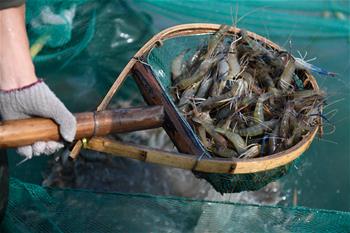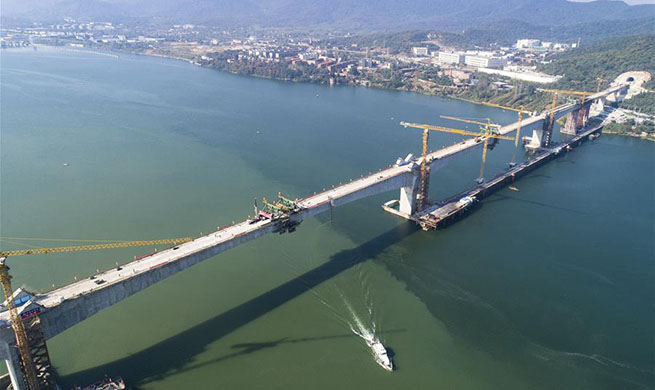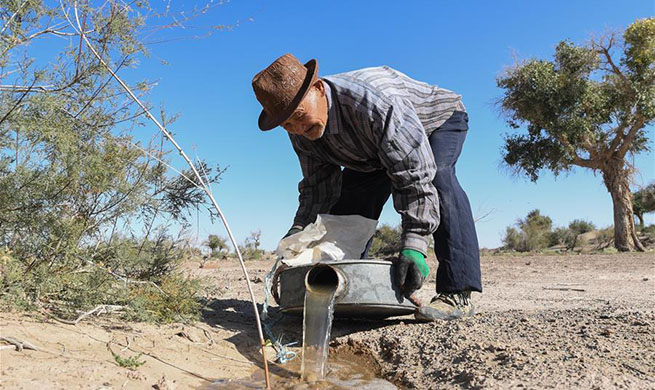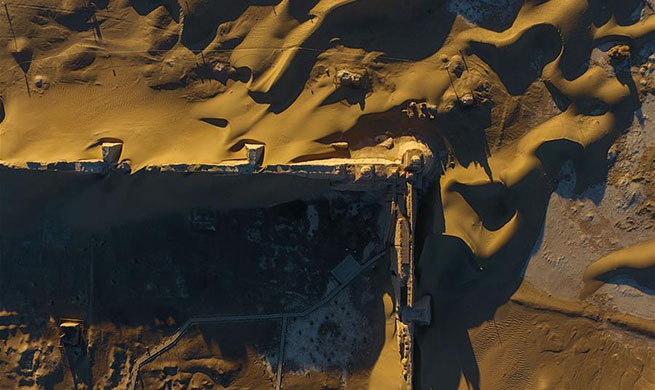ANKARA, Oct. 12 (Xinhua) -- A Turkish court decided on Friday to release U.S. cleric Andrew Brunson whose detention for the past two years has sparked a crisis in bilateral ties and also a crash in the Turkish currency lira.
The fourth hearing in his case was held in a court in western Izmir province, with evangelical pastor Brunson present as well as his wife and U.S. Charge d'affaires Jeffrey Hovenier.
Four witnesses have retracted statements that had linked Brunson to terrorist groups, paving the way for prosecutors to request to lift his house arrest.
The court decided to sentence Brunson to three years, one month and 15 days to jail over terror charges, but freed him on time already served. The court also lifted his travel ban.
His lawyer Ismail Cem Halavut told reporters that his client was now free after the removal of his electronic bracelet and would leave Turkey soon for his country.
"The fact that he is now on a plane to the United States can only be viewed as a significant victory for pastor Brunson and his family," said lawyer Jay Sekulow in a statement.
"My thoughts and prayers are with pastor Brunson, and we hope to have him safely back home soon," U.S. President Donald Trump said on his Twitter account, who was very vocal during Brunson's detention.
Turkish Presidency said in a statement that the ruling "reaffirmed Turkey is a democratic state of law with an independent and impartial judiciary."
Before the hearing, U.S. broadcaster NBC said Turkey and the United States had reached "a secret deal" for Brunson to be released Friday and some charges against him were dropped, in exchange for the United States easing "economic pressure" that included the measures that hit the Turkish currency in the summer.
The 50-year-old pastor, who has lived in Turkey for over two decades, was detained about two years ago over espionage charges and links to a network led by the U.S.-based Turkish cleric Fethullah Gulen and the Kurdistan Workers' Party (PKK).
The Turkish government has accused Brunson of helping "terror groups" that were behind a military coup attempt in July 2016.
Brunson was ordered to be moved from prison to house arrest on July 25 this year for medical reasons. He faced a possible sentence of up to 35 years in prison.
The detention of the U.S. national caused one of the worst diplomatic rows between the two NATO allies.
Trump imposed financial sanctions on Turkey to press the country grappling with an economic turmoil to release its citizen. In return, Ankara increased tariffs on imported American cars, alcohol and tobacco.
The U.S. congress has also threatened to restrict billions of dollars in international financial loans to Turkey and block deliveries of F-35 fighter planes.
Since the start of the year, the lira has lost 35 percent of its value, raising concerns on the health of the Turkish economy hit by high inflation and unemployment rate.
Trump has lauded Brunson as a "great patriot" who has being held "hostage" by Turkey while Turkish President Recep Tayyip Erdogan said he could not interfere in judicial affairs, arguing that Brunson faced serious charges.
U.S. administration officials have said the release of Brunson, and other U.S. nationals detained in Turkey after the coup attempt, would be a significant step towards a reconciliation between Ankara and Washington.
"If he's set free, an important hurdle for the return to a normalization of our relationship will be lifted. It will be an important step towards the reopening of communication ways for other outstanding issues between our two countries," told Xinhua a U.S. source before Friday's hearing.
Turkish officials have implied that the Trump's administration wants to welcome Andrew Brunson home as a way to strengthen the chances of his Republican Party winning the midterm elections in November as evangelical voters are a critical constituency for the president.
The release of Brunson would also strengthen Turkey's hand to move the United States into its corner ahead of a possible crisis with Saudi Arabia, Washington's close ally, regarding the mysterious disappearance of Saudi journalist Jamal Khashoggi in Istanbul ten days ago after he entered the consulate there.
Unconfirmed reports said the journalist who was a critic of the Saudi leadership was killed. While Ankara and Riyadh have agreed to form an joint investigation team to shed light on the affair that has also drew Washington's close attention.













